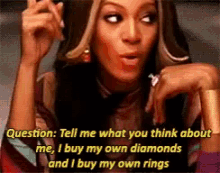
There was a recent article in the New York Times about how some women who have financial difficulties are discovering that it is linked to ADHD. In some cases it manifests as overspending (shopping = dopamine!), forgetting to pay bills on time, or just being bad at managing a budget (because its boring and the brain would rather do anything else).
I used to be like this. I found the entire idea of money both overwhelming and boring. I was 18 years old with a credit card in New York City, which in retrospect was a Bad Choice. I nearly went bankrupt because of my overspending and inability to budget. Between student loans and credit card debt, I was drowning by the time I was 25. Fortunately, due to some lucky circumstances, I was able to get out of trouble. Part of this was my decision to get an office job, because it was a steady income and included fun things like health insurance. I started working in the financial sector and got a crash course in finance. I knew nothing about finance before working in the industry, and I am grateful that I gained that knowledge while I was still young enough to change my ways. I am now careful with money almost to a fault, but it was a long process of educating myself and learning how to manage money. Not everyone is so fortunate, and there is an established gender gap in financial literacy.
This part of the article really stuck out to me:
Ms. Fulmore offers an A.D.H.D. money management program that incorporates whatever makes it exciting, novel or interesting to follow the dopamine road to financial success.
She used sticker charts, colored progress trackers and bullet journaling to “hack the system” of her brain. She also automated her savings and debt payments.
“For me, what has helped has been unlearning a lot of the neurotypical expectations,” she said. “I’m going to approach things differently, and it’s not going to be the way that traditional personal finance education tells you to do something.”
Ms. Fulmore started therapy to deal with the shame she had accumulated from a world that reflected a message that her struggles were her fault. She also started the stimulant medication Vyvanse, which helped her focus and reduce her spending. Aside from her student loans, she’s now free of debt.
Hell yes! Learning to control your finances AND using your knowledge to help other women with ADHD by starting your own business? Throw your hands up at me, etc.
After finishing the article, I did something real dumb.
I read the comments.
I know, I know. I know better. We all know better. Unsurprisingly, the bulk of the negative comments were from men (you can tell by user names such as IndependentRob45 and DontTreadonMe1776). These Real Men of Genius posit themselves as both Financial Experts and apparently Doctors of Medicine! Evidence of said genius below:
To summarize the psychiatric consensus: the solution to this financial irresponsibility is to take amphetamines on a daily basis. Far be it from me to question the docs, but I don't think dosing our biggest spenders with stimulants is going help our inflation problem. This is methed up!
FACT: Adderall doesn’t amp up people with ADHD. It actually calms them down.
Yes, some people abuse stimulants. Adderall is popular among law students and anyone needing to pull all-nighters. In a neurotypical person, Adderall functions as speed. However, if you actually have ADHD, stimulants have the opposite effect. The first time I took Adderall, I took a two and a half hour nap. I felt like someone had given me a Xanax (a commonly prescribed drug that is WORSE for you than Adderall, and benzodiazepines famously have one of the most physically dangerous discontinuation syndromes of any class of drug).
You know what other drug calms people down that has a horrible withdrawal syndrome, is completely legal, and makes billions of dollars every year for the companies that make it? ALCOHOL.
Moving on…
Neglecting to pay your bills, spending too much money, not controlling impulses.... These are not symptoms of a disease. These are symptoms of immaturity. "ADD" did not exist before 1980 and, even today, is not really a "thing" in most of the world. It's mainly a way to sell drugs and therapy. It's particularly sad for children. The "symptoms" for childhood ADD are not paying attention to boring things, fidgeting, being forgetful, being irresponsible, being hyperactive.... These "symptoms" are simply a description of a child! That's what kids are like! Now, these totally normal kids are saddled with a label. Especially sad that so many of these kids are given amphetamines, a highly addictive drug. But it's sure great for Big Pharma.
Here are some actual facts for you, sir:
From the book Outside the Box: Rethinking ADD/ADHD in Children and Adults by Thomas E. Brown, Ph.D. (which I highly recommend):
“…the risk of a child with ADHD eventually developing a substance abuse disorder is significantly greater than for others of similar age if that child is not treated with medication for ADHD than when the the child receives ADHD medication treatment. Treatment with stimulant medication seems to have a protective effect against adolescent substance abuse” (p.199)
Read it again: A child with ADHD who receives correct treatment has a significantly lower risk of substance abuse. In fact, a staggering 25% of people treated for all substance abuse disorders in adulthood have ADHD, and the risk of alcoholism especially is 5 to 10 times higher. Huh, interesting that if you receive medical intervention for a health condition at a young age, you might suffer fewer consequences as an adult! Weird! I don’t think I ever would have developed a problematic relationship with alcohol had I been treated for my disorder earlier. If you don’t properly treat a mental health disorder, the sufferer will wind up self medicating - with food, with alcohol, with illegal drugs, with sex, or as the article stated, shopping.
It’s about damn time we start contending with the fact that addiction is often not a result of moral decay OR a lack of willpower, but that’s another post for another day.
Additionally, stimulant medications are relatively inexpensive. In fact, there are medication shortages in part BECAUSE generic stimulants are not particularly profitable. This information is widely available.
And the crux of the situation:
"Adult ADD" is not real. It was a way for Big Pharma to expand its market beyond the initial target group, which was children. It worked. Adults like drugs just as much as kids, probably more.
This is just one of many comments insisting that ADHD is not real. It is not lost on me that the fact that more women are being diagnosed has coincided with the disorder becoming more controversial. It is also not lost on me that at a time our rights are being stripped away from us brick by brick, there is an investment in restricting something that gives us better control over our lives. Reproductive rights and financial literacy are two keystones to women being able to live lives independent of men, and we live in a country that is hellbent on robbing us of both. In fact, reproductive rights and financial equality are intrinsically linked, but again, that’s a whole other post that I am sure I will write (if I don’t forget that I said I would).
As women become more aware of ADHD as a potential diagnosis, the pushback grows stronger. Much like the invention of the birth control pill - a battle we are still fighting 60 years later - anything that gives women more power and more control over their lives disrupts the patriarchy. Sure, idiots in the comment section may not be the majority of people, but as we learned in 2016, a small vocal minority of people can do a lot of damage. This is a big reason that I started this Substack. This diagnosis and treatment has given me a sense of agency and power that I thought I had lost, and I want other people who feel similarly disempowered to know that there is a solution. That there is hope.
A well established medical condition with clear diagnostic criteria and medication that is safe and effective in 70% of diagnosed patients should not be controversial, but sadly, it is. Mental health stigma is nothing new. Misogyny is nothing new. What is new is the influx of information that is widely available about ADHD. When women are correctly diagnosed and treated, they gain more power over their lives. That is a direct threat to people who want to keep us in our place, to people who want to shame us for our problems, and for people who need to degrade others to feel better about themselves. The only way to combat it is through what people with ADHD do best: talking incessantly about one subject until everyone is sick of hearing it. I gladly volunteer.
Would it be helpful to anyone to do a post about budgeting and finances? Or are there any other topics you’d like me to talk about? LMK in the comments or send me a message.




